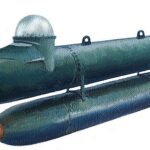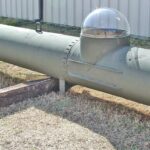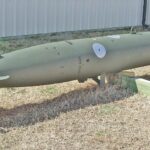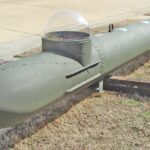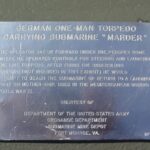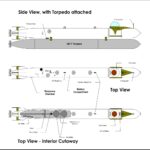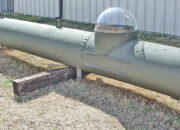Marder
Watercraft
Effect: Hybrid-Experimental
Type: Submarine
Composition: Metal
Place: Europe
Marders were primarily intended for use in the coastal waters to potentially disrupt Allied shipping and invasions.
One-man Torpedo-carrying Submarine (marder), circa 1944
Torpedo Versuchs Anstalt, Eckernfoerde, Germany
Courtesy of the US Army Ordnance Department, Submarine Mine Depot, Fort Monroe, Virginia
Our job is to build a small number in each of many different types of weapons; as soon as the enemy has learned how to deal with one type, we must send an entirely novel one against him. – Admiral of the K=Force Hellmuth Heye, Germany, 1944
During World War II, German U-Boats attempted to control the high seas conducting unrestricted warfare. As the Allies prepared for the Normandy Invasion, the German Navy looked at a number of defensive measures.
Marders were primarily intended for use in the coastal waters to potentially disrupt Allied shipping and invasions. They were easily launched from a beach and were put to use along stretches of the Italian and French coastlines where German troop strength was weak.
Were these “suicide” subs?
Although marders had human pilots, they were not suicide weapons. The pilot maneuvered toward his target, released an explosive torpedo, and then returned to ship or shore. Many missions were fatal however, due to bad navigation, rough weather, CO2 poisoning, or enemy attack. They were most vulnerable when preparing to launch a torpedo. With no periscope, the marder had to run on the surface in order to line up its target.
The were first used in 1944 to attack allied shipping off Courseulles-sur-Mer, France. HMS Quorn and three other ships were sunk in the raid. Later the same year, 42 marders attacked allied shipping near Normandy. Only 26 of the marder returned from the action that sank but a few ships.
Origin: Eckernfoerde, Germany
